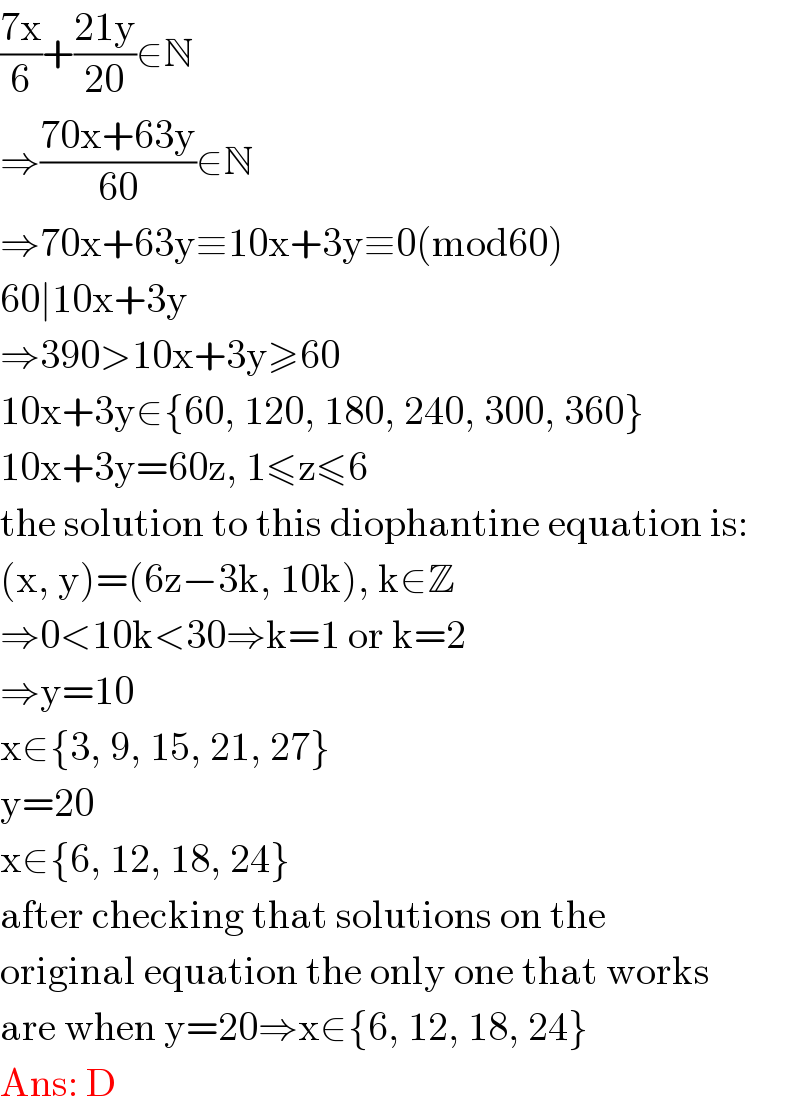Question Number 118930 by Ar Brandon last updated on 20/Oct/20
![Let [x] denote the greatest integer ≤x. Then the number of ordered pair (x,y), where x and y are positive integers less than 30 such that [(x/2)]+[((2x)/3)]+[(y/4)]+[((4y)/5)]=((7x)/6)+((21y)/(20)) is (A) 1 (B) 2 (C) 3 (D) 4](https://www.tinkutara.com/question/Q118930.png)
$$\mathrm{Let}\:\left[{x}\right]\:\mathrm{denote}\:\mathrm{the}\:\mathrm{greatest}\:\mathrm{integer}\:\leqslant{x}.\:\mathrm{Then}\:\mathrm{the} \\ $$$$\mathrm{number}\:\mathrm{of}\:\mathrm{ordered}\:\mathrm{pair}\:\left({x},\mathrm{y}\right),\:\mathrm{where}\:{x}\:\mathrm{and}\:\mathrm{y}\:\mathrm{are} \\ $$$$\mathrm{positive}\:\mathrm{integers}\:\mathrm{less}\:\mathrm{than}\:\mathrm{30}\:\mathrm{such}\:\mathrm{that} \\ $$$$\:\:\:\:\:\:\:\:\:\:\:\:\left[\frac{{x}}{\mathrm{2}}\right]+\left[\frac{\mathrm{2}{x}}{\mathrm{3}}\right]+\left[\frac{\mathrm{y}}{\mathrm{4}}\right]+\left[\frac{\mathrm{4y}}{\mathrm{5}}\right]=\frac{\mathrm{7}{x}}{\mathrm{6}}+\frac{\mathrm{21y}}{\mathrm{20}} \\ $$$$\mathrm{is} \\ $$$$\left(\mathrm{A}\right)\:\mathrm{1}\:\:\:\:\:\:\:\:\:\:\:\:\:\:\left(\mathrm{B}\right)\:\mathrm{2}\:\:\:\:\:\:\:\:\:\:\:\:\:\:\left(\mathrm{C}\right)\:\mathrm{3}\:\:\:\:\:\:\:\:\:\:\:\:\:\:\left(\mathrm{D}\right)\:\mathrm{4} \\ $$
Answered by floor(10²Eta[1]) last updated on 20/Oct/20

$$\frac{\mathrm{7x}}{\mathrm{6}}+\frac{\mathrm{21y}}{\mathrm{20}}\in\mathbb{N} \\ $$$$\Rightarrow\frac{\mathrm{70x}+\mathrm{63y}}{\mathrm{60}}\in\mathbb{N} \\ $$$$\Rightarrow\mathrm{70x}+\mathrm{63y}\equiv\mathrm{10x}+\mathrm{3y}\equiv\mathrm{0}\left(\mathrm{mod60}\right) \\ $$$$\mathrm{60}\mid\mathrm{10x}+\mathrm{3y} \\ $$$$\Rightarrow\mathrm{390}>\mathrm{10x}+\mathrm{3y}\geqslant\mathrm{60} \\ $$$$\mathrm{10x}+\mathrm{3y}\in\left\{\mathrm{60},\:\mathrm{120},\:\mathrm{180},\:\mathrm{240},\:\mathrm{300},\:\mathrm{360}\right\} \\ $$$$\mathrm{10x}+\mathrm{3y}=\mathrm{60z},\:\mathrm{1}\leqslant\mathrm{z}\leqslant\mathrm{6} \\ $$$$\mathrm{the}\:\mathrm{solution}\:\mathrm{to}\:\mathrm{this}\:\mathrm{diophantine}\:\mathrm{equation}\:\mathrm{is}: \\ $$$$\left(\mathrm{x},\:\mathrm{y}\right)=\left(\mathrm{6z}−\mathrm{3k},\:\mathrm{10k}\right),\:\mathrm{k}\in\mathbb{Z} \\ $$$$\Rightarrow\mathrm{0}<\mathrm{10k}<\mathrm{30}\Rightarrow\mathrm{k}=\mathrm{1}\:\mathrm{or}\:\mathrm{k}=\mathrm{2} \\ $$$$\Rightarrow\mathrm{y}=\mathrm{10} \\ $$$$\mathrm{x}\in\left\{\mathrm{3},\:\mathrm{9},\:\mathrm{15},\:\mathrm{21},\:\mathrm{27}\right\} \\ $$$$\mathrm{y}=\mathrm{20} \\ $$$$\mathrm{x}\in\left\{\mathrm{6},\:\mathrm{12},\:\mathrm{18},\:\mathrm{24}\right\} \\ $$$$\mathrm{after}\:\mathrm{checking}\:\mathrm{that}\:\mathrm{solutions}\:\mathrm{on}\:\mathrm{the} \\ $$$$\mathrm{original}\:\mathrm{equation}\:\mathrm{the}\:\mathrm{only}\:\mathrm{one}\:\mathrm{that}\:\mathrm{works} \\ $$$$\mathrm{are}\:\mathrm{when}\:\mathrm{y}=\mathrm{20}\Rightarrow\mathrm{x}\in\left\{\mathrm{6},\:\mathrm{12},\:\mathrm{18},\:\mathrm{24}\right\} \\ $$$$\mathrm{Ans}:\:\mathrm{D} \\ $$
Commented by Ar Brandon last updated on 21/Oct/20
Thank you Sir
